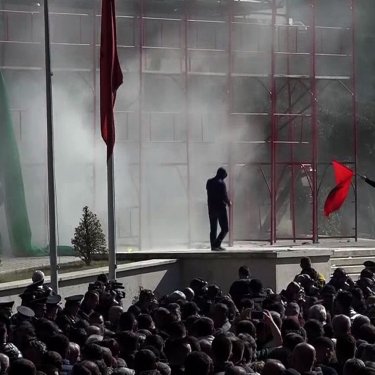Albania urged to protect journalists from protest violence

Reporters Without Borders (RSF) urges the Albanian authorities to protect journalists, who
have repeatedly been among the victims of serious violence during the past four months of
demonstrations calling for Prime Minister Edi Rama’s departure on the grounds of
suspected corruption.
Every week, serious injuries have been sustained by journalists covering the protests, which are held on Saturdays. RSF has learned that at least four journalists were the victims of significant acts of aggression by demonstrators during the particular violent weekend of 11-12 May, when the protests targeted the prime minister’s office.
Besfort Kryeziu, a cameraman with privately-owned Top Channel TV, had to be hospitalized after a Molotov cocktail struck his head, while Eno Xhaja of Top Channel TV and Mateo Brahja of ABC News were assaulted by angry protesters who prevented them from filming and smashed their equipment. Report TV journalist Arsen Rusta reported being the target of serious threats.
“We condemn the current climate of intimidation and violence towards journalists and we call on the authorities to take immediate measures so that the attacks stop,” said Pauline Adès-Mével, the head of RSF’s European Union and Balkans desk.
“This violence and the anti-media rhetoric of certain politicians must be condemned outright for the sake of Albania’s democratic reform efforts and the prospects of progress in its bid to join the European Union. Given the current political situation and the imminence of local elections on 30 June, we are concerned that further incidents could damage Albania’s image and the EU accession process.”
RSF has been worried about the level of violence from the start of the protests. Two journalists, Isa Myzyraj of Ora News TV and Marsela Karapanço of A2 News CNN Albania, had to be hospitalized on 16 February after inhaling teargas.
RSF also condemned the injuries sustained by two journalists, TV Tema’s Eliza Gjediku and freelancer Arben Dajçi, during opposition demonstrations in Tirana on 13 April.
Amid the growing political chaos, the level of mistrust towards the media is reaching unprecedented levels and some women journalists have reported being the targets of sickening attacks.
TV Klan reporter Ola Xama said she was attacked verbally and physically by a member of the Republican National Guard at the Albanian parliament in Abril, while Enkelejda Mema, a journalist with the same TV channel, said she was subjected to serious sexist insults by Academy of Sciences director Skender Gjinushi on 25 May.
After falling seven places, Albania is ranked 82nd out of 180 countries in RSF’s 2019 World Press Freedom Index.



